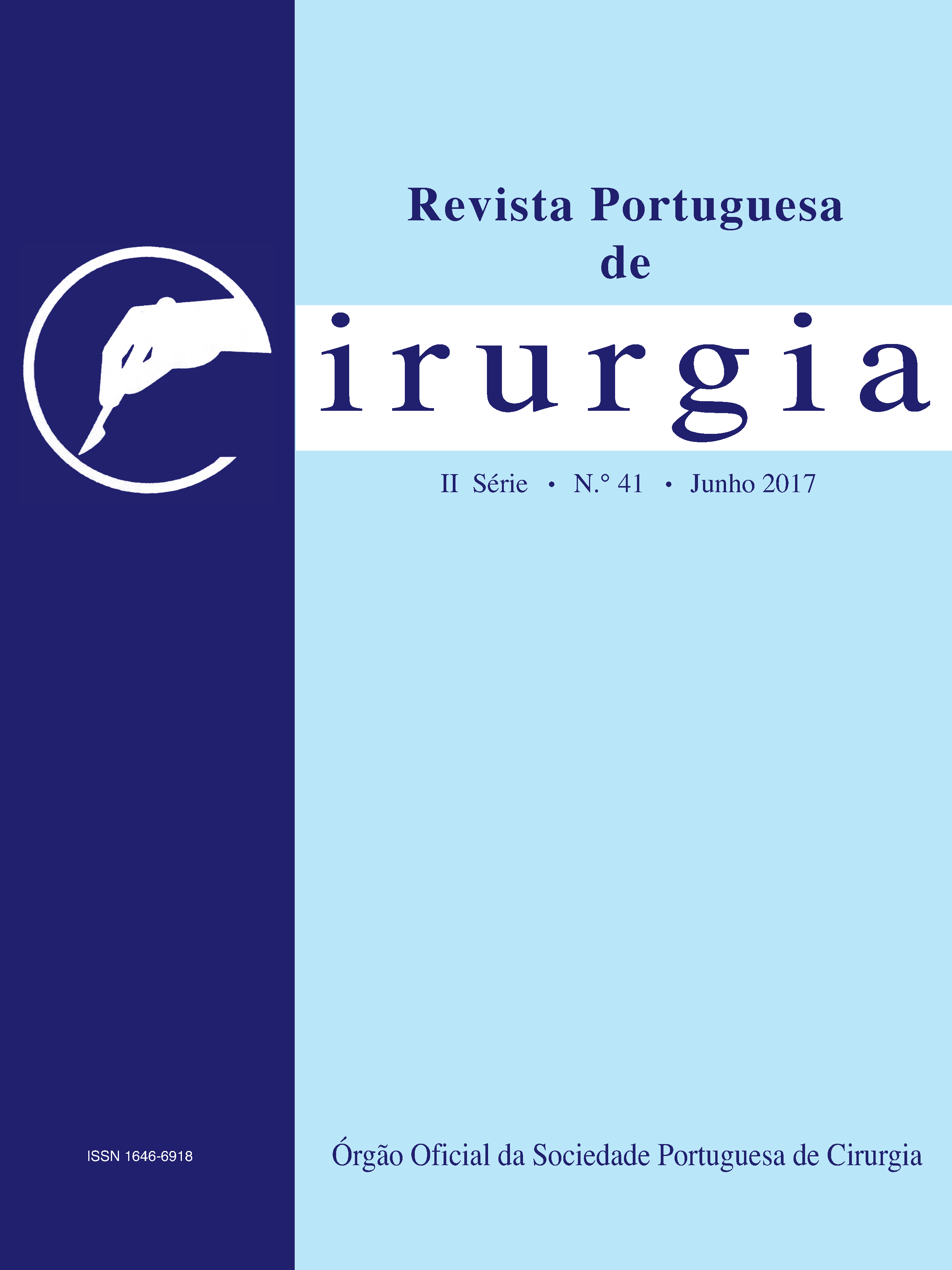General Surgery Residency Characterization in 2015 – the Residents point of view
Abstract
Introduction: The general surgery residency training program has gained complexity, particularly due to laparoscopy. The Comission of General Surgery Residents (Comissão de Internos em Formação Específica em Cirurgia Geral), a chapter of Portuguese Society of Surgery (CIFECG-SPCir), aimed to characterize national general surgery residents in 2015 and evaluate their training program, through a survey. Methods: A survey regarding the subject, consisting of 40 questions, confidential and anonymous was sent via email. The statistical analysis was made with software software SPSS Statistics for Windows®, Version 21.0. Results and Discussion: The online survey was sent to 183 residents and obtained 105 answers (57,4%). The sample is mainly feminine, mean age 29 years, single and childless. The majority of residents dedicates 56 to 85 weekly hours to hospital duty, with prejudice of study time. Annually participation in courses and scientific events is almost always self-financing. There is a geographic variability of scientific work production, with more investigation involved residents in the north. The majority of surgery departments are already structured in functional units, with great organization variability without that translating to more surgeries or laparoscopic procedures. The vast majority of residents have 2 or more operating room days per week, operating more as main surgeon in elective than emergency surgeries. Laparoscopy is mainly executed by assistants and only in less than half of the procedures. The majority of the residents actively participates in outpatients assistance, mainly autonomously. A 24hours emergency rotation is the most frequent period of time per week. The probability to accomplishment the goals set by law (Portaria nº48/2011, January 26th) if higher in a secondary care hospital. The feeling of being prepared for the demands of the future is related to the number of surgeries but not emergency room shifts or study time. Conclusion: There is a wide variability of the national general surgery residency training program. An evaluation and training adequacy is being needed to face the resident and society new expectations.
Downloads
References
Stabile BE. The surgeon: a changing profile. Arch Surg 2008;143:827-31
Fischer JE. The impending disappearance of the general surgeon. JAMA 2007;298:2191-3
Saalwachter AR, Freischlag JA, Sawyer RG, Sanfey HA. The training needs and priorities of male and female surgeons and their trainees. J Am Coll Surg 2005;201:199-205
Diário da República (2015) Portaria n.º 224-B/2015 de 29 de Julho, Diário da República, 1.ª série — N.º 146 — 29 de julho de 2015. https://dre.pt/application/file/69906424. Consultada a 14 de março de 2016
Diário da República (2011) Portaria n.º 48/2011 de 26 de Janeiro, Diário da República, 1.ª série — N.º 18 — 26 de janeiro de 2011. http://www.acss.min-saude.pt/Portals/0/Portaria%20-%20Cirurgia%20Geral.pdf. Consultada a 14 de março de 2016
Sousa HM, Machado TQB, Dubecz A, Barbosa LER, Maia JEF, O que pensam os Internos de Cirurgia Geral do seu internato?, Rev. Port. Cir.(2015) (35):13-21
Herbella FA, Fuziy RA, Takassi GF, Dubecz A, Del Grande JC. Evaluation of trainning and professional expectations of surgery residents. Rev Col Bras Cir 2011;38:280-4
Downloads
Published
Issue
Section
License
Para permitir ao editor a disseminação do trabalho do(s) autor(es) na sua máxima extensão, o(s) autor(es) deverá(ão) assinar uma Declaração de Cedência dos Direitos de Propriedade (Copyright). O acordo de transferência, (Transfer Agreement), transfere a propriedade do artigo do(s) autor(es) para a Sociedade Portuguesa de Cirurgia.
Se o artigo contiver extractos (incluindo ilustrações) de, ou for baseado no todo ou em parte em outros trabalhos com copyright (incluindo, para evitar dúvidas, material de fontes online ou de intranet), o(s) autor(es) tem(êm) de obter, dos proprietários dos respectivos copyrights, autorização escrita para reprodução desses extractos do(s) artigo(s) em todos os territórios e edições e em todos os meios de expressão e línguas. Todas os formulários de autorização devem ser fornecidos aos editores quando da entrega do artigo.



